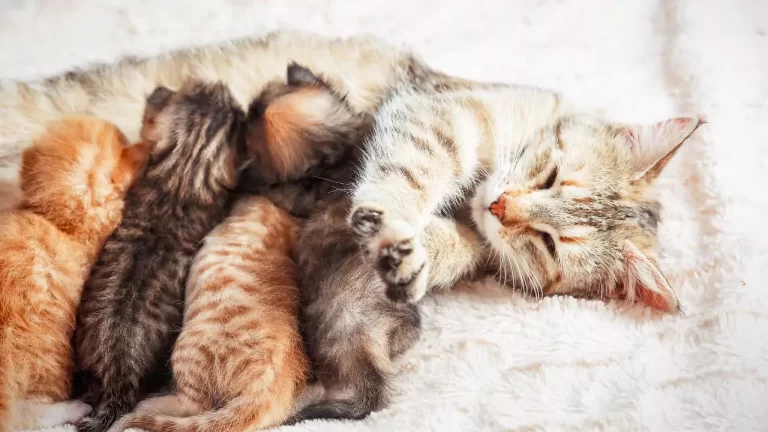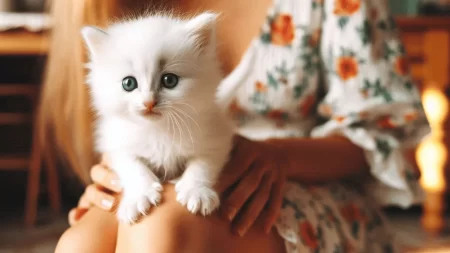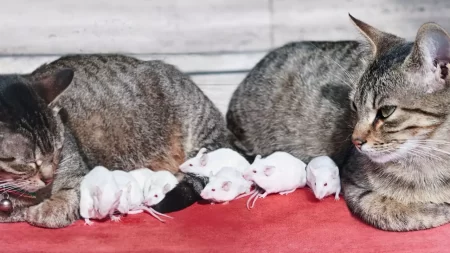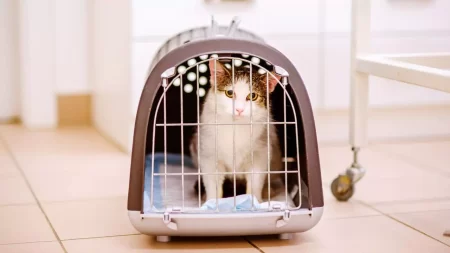Mother cats sometimes engage in the disturbing behavior of eating their kittens. This infanticide occurs for a variety of reasons.
If a kitten is sick, has died, or the mother feels threatened, she may consume the kitten to prevent disease, keep her nest clean, or protect the surviving kittens.
Mother cats can detect illness through their strong sense of smell. First-time mothers and those struggling to produce enough milk are also more likely to eat their young, perhaps because they lack the appropriate maternal instincts.
While the reasons make biological sense, it remains difficult for humans to comprehend the killing of offspring under any circumstances.
Ultimately, mother cats resort to this practice in dire situations out of primal, survival-focused instincts. Their goal is to ensure the health and safety of the remaining kittens in the litter.
Reasons Why Mother Cats May Eat Their Kittens
There are several factors that may trigger a mother cat to eat her kittens. Some of them are related to the health and survival of the kittens, while others are influenced by the environment and the mother cat’s condition. Here are some of the most common reasons why mother cats may eat their kittens:
Birth Defects or Stillbirth
One of the main reasons why mother cats eat their kittens is because they detect that the kitten is unhealthy, deformed, or stillborn. Mother cats have a keen sense of smell and can detect abnormalities in their kittens that may not be visible to us. They may also sense that the kitten is not breathing or moving. In these cases, the mother cat may decide to eat the kitten to prevent it from suffering, to remove it from the nest, or to recover some nutrients that she lost during birth.
To Protect them from Predators
Another reason why mother cats eat their kittens is because they perceive a threat from predators or other animals. This is more common in feral or stray cats that live in harsh conditions and have to defend themselves and their offspring from danger. If the mother cat feels that her nest is not safe or that she cannot move her kittens to a better location, she may eat some or all of them to avoid attracting attention from predators or competitors.
Stress or Feeling Threatened
Stress can also cause a mother cat to eat her kittens. This can be caused by various factors, such as noise, disturbance, overcrowding, lack of food or water, illness, injury, or human interference. Stress can affect the mother cat’s hormones and behavior, making her more aggressive, anxious, or fearful. She may also lose her maternal instincts and fail to recognize her own kittens. If the mother cat feels stressed or threatened, she may eat her kittens as a way of coping with the situation or eliminating the source of stress.
Malnourishment
Malnourishment is another factor that may lead a mother cat to eat her kittens. This can happen if the mother cat is not getting enough food or water, especially during pregnancy and lactation. Malnourishment can weaken the mother cat’s immune system and make her more susceptible to infections and diseases. It can also affect her milk production and quality, making it harder for her to feed her kittens. If the mother cat is starving or dehydrated, she may eat her kittens to survive or to replenish some of the nutrients that she needs.
Mastitis
Mastitis is a condition that affects the mammary glands of female mammals. It is caused by inflammation, infection, injury, or blockage of the milk ducts. Mastitis can cause pain, swelling, redness, heat, and discharge in the affected area. It can also reduce or stop the milk flow and affect the milk quality. Mastitis can make nursing very painful and difficult for the mother cat and her kittens. If the mother cat has mastitis, she may eat her kittens because she cannot feed them properly or because she associates them with pain.
Signs That a Mother Cat Has Eaten Her Kittens
It can be hard to tell if a mother cat has eaten her kittens, especially if you are not present when it happens. However, there are some signs that may indicate this behavior:
Missing or Injured Kittens
The most obvious sign that a mother cat has eaten her kittens is if you notice that some or all of them are missing from the nest. You may also find blood stains, bones, fur, or other remains in or around the nest. Sometimes, the mother cat may not eat the whole kitten but only bite off some parts of it, such as the head, tail, legs, or internal organs. In this case, you may find injured or mutilated kittens in the nest.
Behavior Changes
Another sign that a mother cat has eaten her kittens is if you observe changes in her behavior. She may become more aggressive, restless, nervous, depressed, or withdrawn. She may also lose interest in her remaining kittens and neglect them. She may stop grooming them, licking them, keeping them warm, or stimulating them to urinate and defecate. She may also reject them by pushing them away, hissing at them, biting them, or moving them out of the nest.
Physical Symptoms
A mother cat that has eaten her kittens may also show some physical symptoms, such as weight loss, dehydration, diarrhea, vomiting, fever, or infection. These symptoms may be caused by the stress of eating her kittens, the ingestion of foreign materials, such as hair or bones, or the transmission of diseases or parasites from the kittens. If you notice any of these symptoms in your mother cat, you should take her to the vet as soon as possible.
What to Do if a Mother Cat Eats Her Kittens?
If you suspect or witness that a mother cat has eaten her kittens, you may feel shocked, angry, sad, or guilty. However, you should try to remain calm and understand that this behavior is not intentional or malicious, but rather a natural instinct that is triggered by certain circumstances. Here are some steps that you can take if a mother cat eats her kittens:
Seek Veterinary Care if Necessary
The first thing that you should do if a mother cat eats her kittens is to check her health and well-being. If she shows any signs of illness or injury, such as those mentioned above, you should take her to the vet immediately. The vet can examine her and treat any conditions that she may have. The vet can also spay her to prevent future pregnancies and avoid the risk of repeating this behavior.
Provide Support for the Mother Cat
The second thing that you should do if a mother cat eats her kittens is to provide support and comfort for her. You should try to reduce her stress levels and make her feel safe and secure. You can do this by providing her with a quiet, clean, and comfortable place to rest and recover. You should also give her plenty of food and water and keep her away from other animals or people that may disturb or upset her. You should also avoid touching or handling her or her remaining kittens unless it is absolutely necessary.
Consider Rehoming the Mother Cat
The third thing that you should do if a mother cat eats her kittens is to consider rehoming her or finding her a new owner. This may be a difficult decision, especially if you are attached to the mother cat or if you plan to keep her as a pet. However, rehoming the mother cat may be the best option for both of you in some cases. For example, if you cannot provide adequate care for the mother cat or if you have other pets or children that may not get along with her. Rehoming the mother cat may also help her find a more suitable environment where she can be happy and healthy.
Other Common Behavioral and Medical Issues in Mother Cats
Eating their kittens is not the only issue that may affect mother cats and their newborn kittens. There are some other common behavioral and medical issues that you should be aware of and prepared for if you have a pregnant or nursing cat. Some of these issues are:
Moving or Rejecting Kittens
Some mother cats may move their kittens from one place to another several times after giving birth. This is usually done to find a safer or more comfortable spot for the nest. However, moving the kittens too often or too far can cause stress and confusion for both the mother and the kittens. It can also expose them to potential dangers, such as predators, parasites, or diseases. Some mother cats may also reject one or more of their kittens by ignoring them, pushing them away, or leaving them behind. This can happen if the kitten is sick, weak, deformed, or different from the rest of the litter. It can also happen if the mother cat is inexperienced, stressed, ill, or overwhelmed by too many kittens.
Postpartum Medical Conditions
Some mother cats may develop postpartum medical conditions after giving birth. These conditions can affect their health and ability to care for their kittens. Some of these conditions are:
- Eclampsia: This is a life-threatening condition that occurs when the mother cat has low blood calcium levels due to excessive milk production. It can cause muscle tremors, seizures, weakness, fever, panting, drooling, or coma.
- Metritis: This is an infection of the uterus that occurs when bacteria enter the womb during or after delivery. It can cause fever, lethargy, loss of appetite, foul-smelling discharge, abdominal pain, or bleeding.
- Mastitis: This is an inflammation or infection of the mammary glands that we already discussed above.
- Retained placenta: This occurs when the mother cat does not expel one or more placentas after giving birth. It can cause infection, bleeding, fever, loss of appetite, or depression.







